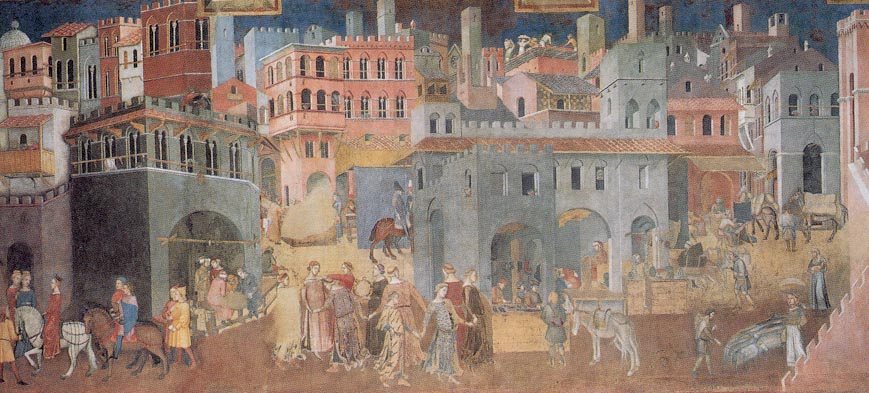
Week 6: The City
 |
DISCUSSION GROUP
Week 6: The City |
These are the issues you should think about this week:
1. What, in the context of later medieval Europe, was
a town or a city?
2. What was a citizen?
3. What part did citizens play in city government?
4. What educational ideas were associated with humanism?
5. Should humanism be seen as a republican or even an
urban movement?
6. In what other ways can we see cities promoting their
identity and their importance?
All the questions relate to some degree to the text.
The Panegyric to the City of Florence (c.1403-4)
The historian Hans Baron argued that the threat posed by Milan under the Visconti despots between 1390 and 1420 explains why so many Florentine writers became so concerned with the Republican ideals of liberty and civic involvement: this new ‘civic’ humanism was rooted in a new philosophy of political engagement and active life, devoted to the celebration of Florence’s republican liberties. The most famous example is Leonardo Bruni of Arezzo, pupil of the Chancellor of Florence, Coluccio Salutati. Bruni apparently underwent a conversion from scholarly aloofness to active defence of republican political values: these ideas were central to his Panegyric to the City of Florence written in 1403 or 1404 during a lull in the on-going conflict with Milan. He later developed his ideas works such as his History of the Florentine people (1415-1429). Other historians have criticized Barons’ thesis, arguing that he underestimated the extent to which the ideas were not new at all but an inheritance from earlier writers who also praised liberty - that is to say freedom from external interference and freedom to take up an active part in the running of the commonwealth.
Questions to consider:
1. What is the difference between a Republic and a Despotism such as Milan?
2. Why does Bruni argue in section 2 that the Florentine people are descended from the Romans? Why does he prefer to place their origins in the Republic rather than the subsequent Empire? What have the Florentines inherited from their ancestors?
3. According to Bruni, particularly in section 3, why has Florence acted as the champion of Republicanism?
4. What dangers does Florence face? Do they only lie outside of the Republic?
5. In section 4 Bruni talks about the constitution of the city. It is not a democracy, so what is it about it that allows Bruni to justify it in such glowing terms?
6. Liberty and freedom are central to Bruni’s Panegyric: what does he mean by ‘liberty’? In what sense were the people of Florence ‘free’? How does this compare with modern notions of democratic freedom and liberty?
7. What might be the significance of Bruni's comments about the use of the vernacular?
8. Why was Bruni writing this text and for whom? What reasons does he give within the Panegyric itself? Bruni left Florence in 1405 and went to work as a secretary for the papacy – an institution that embodied thoroughly monarchic (if not despotic) tendencies – but returned to Florence in 1415 and later became Chancellor. Some historians have argued that he was therefore writing the Panegyric as an intellectual exercise and as a showcase for his considerable talents. How might that affect our reading of the text?